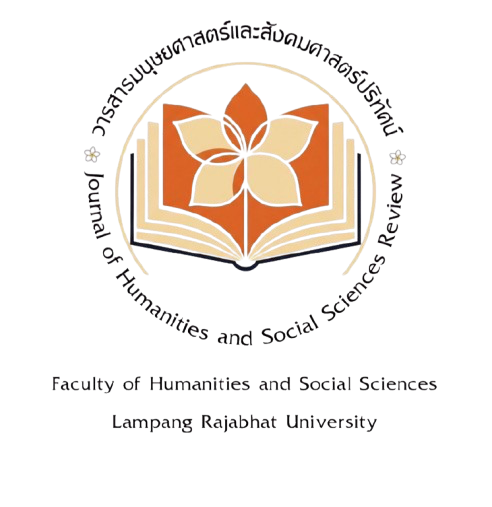Elements of Vegetarian Culture in Thai Society: A Case Study of Vegetarian in Bangkok
Keywords:
vegetarian culture, elements of culture, BangkokAbstract
This research article aims to study the components of the vegetarian culture in Thai society. It employs qualitative research methods, collecting data through document studies and in-depth interviews with key informants, including personnel from important venues that organize vegetarian festivals and individuals who practice vegetarianism, totaling 21 participants. Additionally, non-participant observation was conducted at 11 sites where vegetarian rituals are held to gather information and analyze the components of the vegetarian culture.
The study results found that 1) Concept aspect: It Refers to the beliefs in Mahayana Buddhism and Taoism, both of which involve the worship of star constellations. During the Vegetarian Festival in the ninth month, Mahayana Buddhists renounce worldly desires and observe precepts as a form of worship to the Nine Emperor's. In Taoism, they venerate and worship the Nine Emperor's and Thep Kritikamatu. The principles of vegetarianism help ensure that the practice is carried out correctly according to these beliefs; 2) Organization aspect: There will be government, private and civil society organizations participating in the continuation and dissemination of vegetarian culture, including organizing vegetarian festivals and various ceremonies; 3) Usage aspect: daily vegetarian practices do not involve specific ceremonies. However, during the Vegetarian Festival, major and daily rituals are held. Significant ceremonies include the invocation of the Nine Emperor's (Kio Ong Huk Chow), etc. The rituals in Mahayana Buddhism and Taoism are similar in nature; 4) Instrumental and Symbolic Objects aspect: Including Important venues, vegetarian food, and significant symbols play crucial roles in conveying meaning and promoting understanding of the principles and objectives of the festival.
References
กฤตยกร ส่งต่าย และ วลัยพร รัตนเศรษฐ. (2565). ความร่วมมือของภาครัฐ ภาคเอกชน และภาคประชาสังคม ในการขับเคลื่อนนโยบายเศรษฐกิจสร้างสรรค์ อำเภอเมืองสกลนคร จังหวัดสกลนคร. วารสารบัณฑิตวิทยาลัย, 11(3), 503-518.
กุลธิดา อู่บูรณกุล. (2555). กระบวนการสื่อสารเพื่อสืบทอดประเพณีถือศีลกินผักจังหวัดภูเก็ต (วิทยานิพนธ์ปริญญามหาบัณฑิต). สืบค้นจาก http://cuir.car.chula.ac.th/handle/123456789/37615
เกตุมาตุ ดวงมณี. (2558). พลวัต ความหมาย อิทธิพล และความเชื่อ ของคำศัพท์ภาษาจีนที่ปรากฏในบริบทประเพณีกินเจของชาวไทยเชื้อสายจีนในจังหวัดตรัง. มหาวิทยาลัยวลัยลักษณ์สงขลา.
ชลธิชา นิสัยสัตย์ และ วัชรี ปั้นนิยม. (2562). ลักษณะเด่นและพลวัตของเทศกาลกินเจโรงเจบ้านหมู่ ตำบลสาวชะโงก อำเภอบางคล้า จังหวัดฉะเชิงเทรา ในบริบทสังคมไทยร่วมสมัย. วารสารวิชาการมนุษยศาสตร์และสังคมศาสตร์ มหาวิทยาลัยบูรพา, 28(1), 73-97.
ถาวร สิกขโกศล. (2558). อันเนื่องด้วยเทศกาลกินเจ. กรุงเทพมหานคร: สมาคมเผยแผ่คุณธรรม “เต็กก่า” จีจินเกาะ.
ธนัสถ์ สุวัฒนมหาตม์. (2549). เทศกาลกินเจในเดือนเก้า. กรุงเทพมหานคร: สมาคมเผยแผ่คุณธรรม “เต็กก่า” จีจินเกาะ.
ธนัสถ์ สุวัฒนมหาตม์. (2551). เทศกาลกินเจในเดือนเก้าและปิตุมาตาอนันคุณทุรกตเวทิตาสูตร. ศูนย์ไทยธิเบต: บริษัทส่องศยามจำกัด.
ปณิตา สระวาสี. (2559,29 กันยายน). ประเพณีกินเจและกินผัก. สืบค้นจาก https://mgronline.com/business/detail/9590000098147
ประภัสสร โพธิ์ศรีทอง. (2558, 1 เมษายน). โลกาภิวัตน์กับการจัดการวัฒนธรรม. สืบค้นจาก http://www.oknation.net/blog/thaitourismsociety/2013/10/04 /entry-1
พวงผกา ประเสริฐศิลป์. (2541). พื้นฐานวัฒนธรรมไทย. กรุงเทพมหานคร: คณะมนุษยศาสตร์และสังคมศาสตร์ สถาบันราชภัฏสวนดุสิต.
รัชดาภรณ์ เสนางาม. (2544). ความรู้และบริโภคนิสัยของผู้ที่รับประทานอาหารเจในเขตอำเภอเมือง จังหวัดเชียงใหม่. เชียงใหม่ : บัณฑิตวิทยาลัย มหาวิทยาลัยเชียงใหม่. สืบค้นจาก http://repository.cmu.ac.th/handle/6653943832/27693.
เรือนแก้ว ภัทรานุประวัติ. (2552). เทศกาลและพิธีกรรมสำคัญของศาลเจ้าจีนในจังหวัดสมุทรสงคราม. วารสารวิชาการมหาวิทยาลัยหอการค้าไทย, 29(3), 113-138.
วิเชียร รักการ. (2529). วัฒนธรรมและพฤติกรรมของไทย. กรุงเทพมหานคร: โอ.เอส.พริ้นติ้งเฮ้าส์.
ศิลปชัย ศรีเกียรติ. (2541). ความสัมพันธ์ระหว่างวัฒนธรรมโรงเรียนกับประสิทธิผลของโรงเรียนขยายโอกาสทางการศึกษา สำนักงานคณะกรรมการการประถมศึกษาแห่งชาติ ในเขตการศึกษา 6 (วิทยานิพนธ์ปริญญามหาบัณฑิตไม่ได้ตีพิมพ์). มหาวิทยาลัยบูรพา, จังหวัดชลบุรี.
สำนักงานเขตสัมพันธวงศ์. (2562). โครงการประเพณีงานเจเยาวราช. สืบค้นจาก https://www.oic.go.th/FILEWEB/CABINFOCENTER9/DRAWER068/GENERAL/DATA0001/00001665.PDF
หน้าที่ของวัฒนธรรม. (2556, 22 มิถุนายน). สืบค้นจาก https://traditionofthailand.blogspot.com/2013/06/blog-post_22.html
อรหทัย รุ่งทวีวรนิตย์. (2550). บทบาทของเทศกาลกินเจในสังคมไทย (การศึกษาค้นคว้าอิสระศิลปะศาสตรมหาบัณฑิตไม่ได้ตีพิมพ์), มหาวิทยาลัยเกษตรศาสตร์, กรุงเทพมหานครฯ.
Business Today. (2562, 26 กันยายน). กินเจแบบประหยัดใช้เงินน้อยลง แต่เทรนด์คนกินเพิ่มขึ้น. สืบค้นจาก https://www.businesstoday.co/bt-news/26/09/2019/7327/
Fan Jun. (2019). Big Dipper belief and Thai-Chinese belief ritual of “Nine Emperor's Fast days”. Proceedings of the 2nd International Conference on Chinese Studies 2019 (pp. 199-211).สืบค้นจาก https://chin.buu.ac.th/public/backend/upload/chin.buu.ac.th/research/file/research162789903600160500.pdf
MGR Online. (2552). ททท.พึ่งเทศกาลกินเจดันนักท่องเที่ยวต.คพุ่ง. สืบค้นจาก https://mgronline.com/daily/detail/9520000109760

Downloads
Published
How to Cite
Issue
Section
License
Copyright (c) 2025 Journal of Humanities and Social Sciences Review, Lampang Rajabhat University

This work is licensed under a Creative Commons Attribution-NonCommercial-NoDerivatives 4.0 International License.
This article is published under a Creative Commons Attribution-NonCommercial-NoDerivatives 4.0 International License (CC BY-NC-ND 4.0), which allows others to share the article with proper attribution to the authors and prohibits commercial use or modification. For any other reuse or republication, permission from the journal and the authors is required.


